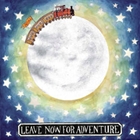Feedle, Leave Now for Adventure
reviewed by hiram lucke

Without a doubt, Feedle’s Leave Now for Adventure was one of my favorite albums of 2007, if not my absolute favorite. Feedle, a former member of 65daysofstatic (and the person behind the mix of that band’s “Retreat! Retreat!”), combines the glitchy beats and movements of electronica--like fellow Sheffielders Autechre--and the subdued-yet-loud dreamy qualities of shoegazing’s bent guitars/keyboards to form a music that is equal parts pastoral beauty and post-industrial waking nightmare. Feedle works in the same vein as bands like M83, especially that former duo’s single “Run into Flowers,” or the American band Tree Wave, but without their reliance on oddball homemade instruments. The strongest difference between those two bands and Feedle is that on Leave Now for Adventure, he uses the continual layering of sound onto a basic premise to move each song, and the album, forward into ever increasing waves.
Acting as a combination warning signal and early-morning alarm, the lead track “Song for Dogs” starts with an overly distorted white noise blast that eventually flattens into a throbbing bass line to which Feedle continually adds layers of noise and melody. The fever pitch is interrupted in the middle as the music falls away into the beat, then slowly climbs back to a crescendo before everything dissolves into a mist in the end. The effect is like watching a marathon over grassy hills where the runners start at a full run, slow to a mild sprint, then a walk staring at the scenery, and finally they all disappear into rolling banks of fog in a valley. Only then do you realize that it wasn’t the runners who were moving, but the background instead.
On other standout tracks like “Everything Slow” the mood of the music becomes layered with frazzled nerves and carefully crafted naiveté. The song starts with a voice nervously intoning, “I might never go to sleep again. I might stay awake forever.” and moves into a chopped-up human beatbox bit that sputters out the rhythm like The Little Engine That Could on a three day meth bender. Later, bubbling pianos and the delayed exhaust of toy space ships move in the sky while reversed keyboard sounds ping around the headphones, whistling begins, and a female voice whispers in a French accent, “hallo.” The song “This Troubles All Dust” builds from a bluesy slide guitar line to a Peter Gabriel influenced afro-beat chorus of chanted, wordless voices and steady rhythm, only to give way to a toy piano’s tinkling while someone in the corner states, “It’s a lovely day, let’s get away.” The wistful mood is broken first by feedback laden guitar chords cutting in, and then the guitar intro and chorus come together again, this time emphasized with a distorted break beat. “Song for Cats” uses a pentatonic phrase on chiming keys and bells with banjo adding a countermelody to denote a Chinese folk song for the titular cats lightly making their way in the morning dew before becoming a wave of reverb and distortion.
The album’s strength lies within its juxtaposition of startling noises and glistening production touches that give it a cheerful quality even while keeping you alert and on point in regards to what may come next. The children’s book-like cover of a train on the moon, the declarative (but not emphatically so) title, and the only vocal line “It’s a lovely day, let’s get away,” points to the underlying subtext of the album, movement within stasis. As each song builds upon itself with continual waves of distortion and reverb only to have it give way and recede to the heart of the song again, the listener rides within a world masterfully created by Feedle. The final two songs, the Celtic-jig-meets-Pachelbel-in-a-drum-machine, “Go Home Revolving,” and the understated melancholy of the simple “I May Not Come This Way Again” ably sum up the entire album and remind us that, as we leave the world of Feedle, he is sad to see us go, but stasis does not mean unhappiness. It’s only a waiting game until you can press play again and the next wave comes. Music that can do that is one of the most beautiful occurrences on this planet.
Copyright (c) 2008 erasing clouds |
|